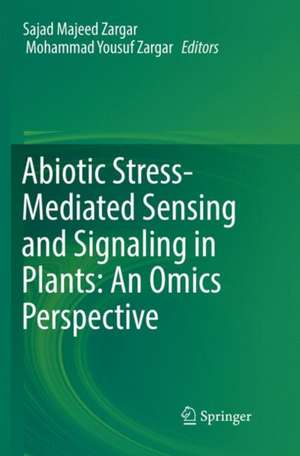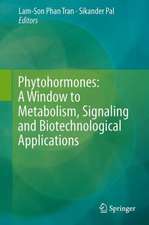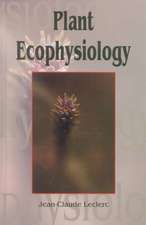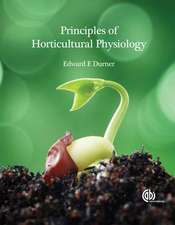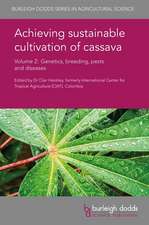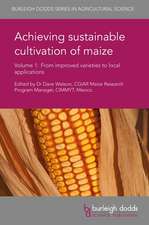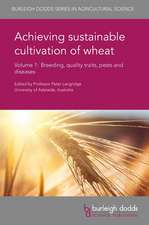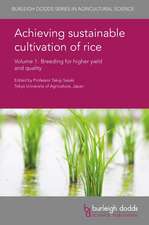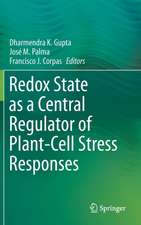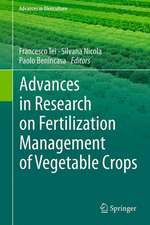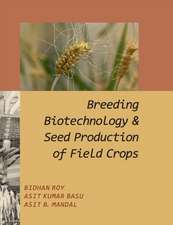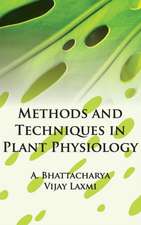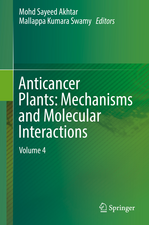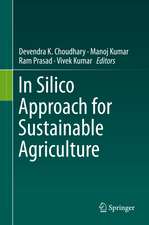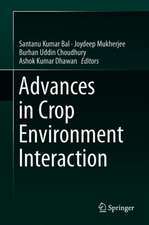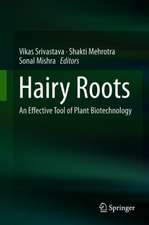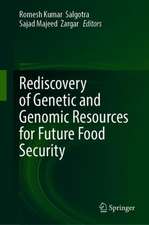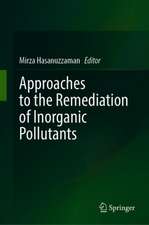Abiotic Stress-Mediated Sensing and Signaling in Plants: An Omics Perspective
Editat de Sajad Majeed Zargar, Mohammad Yousuf Zargaren Limba Engleză Paperback – 25 dec 2018
This book focuses on research advances regarding plant responses to abiotic stresses, from the physiological level to the molecular level. It highlights new insights gained from the integration of omics datasets and identifies remaining gaps in our knowledge, outlining additional focus areas for future crop improvement research.
Plants have evolved a wide range of mechanisms for coping with various abiotic stresses. In many crop plants, the molecular mechanisms involved in a single type of stress tolerance have since been identified; however, in order to arrive at a holistic understanding of major and common events concerning abiotic stresses, the signaling pathways involved must also be elucidated. To date several molecules, like transcription factors and kinases, have been identified as promising candidates that are involved in crosstalk between stress signalling pathways. However, there is a need to better understand the tolerance mechanisms for different abiotic stresses by thoroughly grasping the signalling and sensing mechanisms involved.
Accordingly, this book covers a range of topics, including the impacts of different abiotic stresses on plants, the molecular mechanisms leading to tolerance for different abiotic stresses, signaling cascades revealing cross-talk among various abiotic stresses, and elucidation of major candidate molecules that may provide abiotic stress tolerance in plants.
| Toate formatele și edițiile | Preț | Express |
|---|---|---|
| Paperback (1) | 794.72 lei 38-44 zile | |
| Springer Nature Singapore – 25 dec 2018 | 794.72 lei 38-44 zile | |
| Hardback (1) | 956.18 lei 22-36 zile | |
| Springer Nature Singapore – 6 mar 2018 | 956.18 lei 22-36 zile |
Preț: 794.72 lei
Preț vechi: 1045.68 lei
-24% Nou
Puncte Express: 1192
Preț estimativ în valută:
152.07€ • 159.20$ • 125.83£
152.07€ • 159.20$ • 125.83£
Carte tipărită la comandă
Livrare economică 02-08 aprilie
Preluare comenzi: 021 569.72.76
Specificații
ISBN-13: 9789811339547
ISBN-10: 9811339546
Pagini: 350
Ilustrații: XVIII, 350 p. 32 illus., 30 illus. in color.
Dimensiuni: 155 x 235 mm
Greutate: 0.59 kg
Ediția:Softcover reprint of the original 1st ed. 2018
Editura: Springer Nature Singapore
Colecția Springer
Locul publicării:Singapore, Singapore
ISBN-10: 9811339546
Pagini: 350
Ilustrații: XVIII, 350 p. 32 illus., 30 illus. in color.
Dimensiuni: 155 x 235 mm
Greutate: 0.59 kg
Ediția:Softcover reprint of the original 1st ed. 2018
Editura: Springer Nature Singapore
Colecția Springer
Locul publicării:Singapore, Singapore
Cuprins
Chapter 1. “Omics”: A Gateway Towards Abiotic Stress Tolerance.- Chapter 2. Second Messengers: Central Regulators in Plant Abiotic Stress Response.- Chapter 3. Signaling Peptides: Hidden Molecular Messengers of Abiotic Stress Perception and Response in Plants.- Chapter 4. Reactive Oxygen Species (ROS) – A Way to Stress Survival in Plants.- Chapter 5. Role of Cuticular Wax in Adaptation to Abiotic Stress - A Molecular Perspective.- Chapter 6. Abiotic Stress Response in Plants: A Cis-Regulatory Perspective.- Chapter 7. Multifarious Role of ROS in Halophytes: Signaling and Defense.- Chapter 8. Enhancing Cold Tolerance in Horticultural Plants Using In Vitro Approaches.- Chapter 9. Omics Based Stratagies for Improving Salt Tolerance in Maize (Zea mays L.).- Chapter 10. Drought Stress Tolerance in Wheat: Omics Approaches in Understanding and Enhancing Antioxidant Defense.- Chapter 11. Signalling During Cold Stress And its Interplay with Transcriptional Regulation.- Chapter 12. Cross-Talk Between Phytohormone Signaling Pathways under Abiotic Stress Conditions and Their Metabolic Engineering for Conferring Abiotic Stress Tolerance.
Notă biografică
Sajad Majeed Zargar, Ph.D, is currently an Assistant Professor at Sher-e-Kashmir University of Agricultural Sciences & Technology of Kashmir (SKUAST-Kashmir) in India. He was previously a Visiting Professor at the Nara Institite of Science & Technology, Japan. He has worked as an Assistant Professor at SKUAST-Jammu, Baba Ghulam Shah Badshan University, Rajouri (BGSB) in India. He has also worked as scientist at Advanta India Limited, Hyderabad, India and TERI (The Energy & Resources Institute), New Delhi, India. Dr. Zargar is receipt of CREST oversea’s fellowship from DBT and is also recipient of Goho grant from Govt. of Japan. He has received several awards for his work and research. He is also the member and representative of INPPO (International Plant Proteomics Organisation). His editorial activities and scientific memberships include publishing research and review articles in international journals and as a reviewer. He has been affiliated with several internationally reputed journals and is also reviewer of reputed journals Frontires in Plant Science, 3 Biotech, Scientia Horticulture, Methods in Ecology and Evolution, Australian Journal of Crop Science and many others. Dr. Zargar has been invited to give many lectures at professional meetings and workshops and has received grants for research projects under his supervision.
Mohammad Yousuf Zargar, Ph.D, is currently Director Research at Sher-e-Kashmir University of Agricultural Sciences & Technology of Kashmir (SKUAST-Kashmir) in India. He was previously Dean, Faculty of Agriculture; Dean, Faculty of Forestry; Associate Director Research and Associate Dean, Faculty of Agriculture, SKUAST-Kashmir. Prior to that he has worked as Professor-cum-Chief Scientists (Microbiology) at SKUAST-Kashmir. Dr. Zargar has published more than 160 research papers in the scientific journals of national and international repute. He has guided 8 students for the doctoral programme and 6 for the master’s programme.He has received many honours and awards for his contribution to research work. His major contribution has been on fermentation technology for mass multiplication of biofertilizers and biocontrol agents. Dr. Zargar has received appreciations for his product “Shalimar Microbes”, a consortium of microbes that decompose waste in a short period. Dr. Zargar has been actively pursuing the research on cold tolerant microbes for soild / liquid waste decomposition and nutrient mobilisation. He has also served as associate editor of several scientific journals. Presently, Dr. Zargar is guiding research programmes of the University in agriculture, animal husbandry and other allied sections.
Textul de pe ultima copertă
The natural environment for plants is composed of a complex set of abiotic and biotic stresses; plant responses to these stresses are equally complex. Systems biology allows us to identify regulatory hubs in complex networks. It also examines the molecular “parts” (transcripts, proteins and metabolites) of an organism and attempts to combine them into functional networks or models that effectively describe and predict the dynamic activities of that organism in different environments.
This book focuses on research advances regarding plant responses to abiotic stresses, from the physiological level to the molecular level. It highlights new insights gained from the integration of omics datasets and identifies remaining gaps in our knowledge, outlining additional focus areas for future crop improvement research.
Plants have evolved a wide range of mechanisms for coping with various abiotic stresses. In many crop plants, the molecular mechanisms involved in a single type of stress tolerance have since been identified; however, in order to arrive at a holistic understanding of major and common events concerning abiotic stresses, the signaling pathways involved must also be elucidated. To date several molecules, like transcription factors and kinases, have been identified as promising candidates that are involved in crosstalk between stress signalling pathways. However, there is a need to better understand the tolerance mechanisms for different abiotic stresses by thoroughly grasping the signalling and sensing mechanisms involved.
Accordingly, this book covers a range of topics, including the impacts of different abiotic stresses on plants, the molecular mechanisms leading to tolerance for different abiotic stresses, signaling cascades revealing cross-talk among various abiotic stresses, and elucidation of major candidate molecules that may provide abiotic stress tolerance in plants.
Caracteristici
Describes impact of various abiotic stresses on plants Presents the strategies to cope up with abiotic stress tolerance Emphasizes on cross-talk among different abiotic stresses Describes sensing and signaling responses mediated by abiotic stresses
